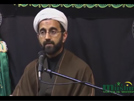Foreword
- Details
- Hits: 19628
Foreword
--------------------------------------------------------------------------------
The great, expansive personality of Amir al-mu'minin (Commander of the Believers), `Ali - may peace be upon him - is broader and more multi-faceted than anything that one person can enter into in all its aspects and parts, or bring his restless mind to reflect. For a single individual, the most that is possible is that he choose one or several specific, limited areas for study and research, and content himself with that.
One of the aspects and areas of the being of this great individual is the effect he had on people, either positive or negative, or, in other words, his powerful "attraction and repulsion", which still now exerts its active influence; and it is with this that we shall be concerned in this book.
The personalities of individuals are not all the same in the reaction they .produce in spirits and souls. The weaker the personality, the fewer minds it engages and the fewer hearts it excites and agitates. The greater and more powerful it is, the more it excites and provokes a reaction in the mind, although the reaction may be positive or negative.
Those personalities who excite minds and provoke a reaction are spoken of everywhere, they are the subjects of debates and disputes, they become the themes of poetry, painting and other arts, and the heroes of stories and other writings. These are all things which are true to the greatest extent in the case of 'Ali (as) [ (as): is the abbreviation of the Arabic phrase `alay-hi/ha/himu 's-salam (may peace be upon him/her/them).] and in this respect he has no rival, or at least very few rivals. It is said that Muhammad ibn Shahrashub al-Mazandarani, who was one of the greatest Shiite scholars of the 7th century A.H. (13th century A.D.), had a thousand books with the title "Manaqib" (Noble Virtues), in his library, all written about `Ali (as) , at the time he wrote his own famous "Manaqib". [1] This is one indication of how much the exalted personality of the master has engaged minds throughout history.
The basic mark of distinction of 'Ali (as) and other people who are bright with the rays of Truth is that as well as engaging people's minds and occupying their thoughts, they give light, warmth, love, joy, faith and strength to their hearts.
Philosophers like Socrates, Plato, Aristotle, Ibn Sina or Descartes are also heroes of the mastering of ideas and the exercise of the mind. The leaders of social revolutions, especially in the last two centuries, have, to a greater extent, created a kind of adoration among their followers. The shaykhs of Sufism from time to time bring their followers so far into the stage of "submission" that if "the keeper of the tavern" gives the cue, they will stain their prayer-rugs with wine.' But in none of these cases do we see fervour and ardour combined with gentleness, kindness, sincerity and compassion as history has shown among the followers of `Ali. If the Safavids made dervishes into a war-like army of skilled fighters, they did so in the name of `Ali, not in their own.
Spiritual goodness and beauty, which love and sincerity bring about, is one thing; supremacy, benefit, and what is of advantage in life, which is what the social leader deals in, or intellect and philosophy, which is what the philosopher deals in, or the establishing of "sovereignty" and "power" which is what the gnostic deals in, is something else.
There is a well-known story that one of Ibn Sina's students said to his teacher that if, with his extraordinary understanding and intelligence, he were to make a claim to prophecy, people would gather round him; but Ibn Sina said nothing, till once, when they were on a journey together in wintertime, Ibn Sina awoke from his sleep one morning at dawn, woke up his student, and told him he was thirsty and to go and fetch some water. The student procrastinated and made excuses: however much Ibn Sina persisted, the student was not prepared to leave his warm bed in the cold winter. At that moment the cry of the muezzin called out from the minaret: "Allahu akbar, Allahu akbar ..... ". Ibn Sina saw that this was a good opportunity to give the answer to his student, so he said: "You, who averred that if I made claim to be a prophet people would believe in me, look now and see how the command I just gave to you, who have been my student for years and have benefited from my lessons, has not even had enough effect to make you leave your warm bed to fetch me some water. But this muezzin has obeyed the four hundred year old command of the Prophet, got up from his warm bed, climbed up to this height and borne witness to the unity of God and to his Prophet. Look and see how great the difference is! "
Philosophers produce students, not followers; social leaders create followers but not complete men; qutbs and shaykhs of Sufism make "lords of submission", not active fighters for Islam.
In 'Ali we find the characteristics of the philosopher, the characteristics of a revolutionary leader, the characteristics of a Sufi shaykh and some of the characteristics of prophets. His school is the school of the intellect and thought, the school of revolution, the school of submission and discipline, and the school of goodness, beauty, ecstasy and movement.
Before he became the just leader (imam) of others, and behaved with justice towards them, `Ali (as) was himself a harmonised, equilibrated being; he had gathered together the perfections of humanity. He possessed both a deep and far reaching mind, and tender and overflowing affections; he had both perfection of body and perfection of spirit; in the night, in worship, he cut himself off from everything else, and during the day he was active among the people. In the daytime, people saw his kindness and altruism, and listened to his advice, counsel and wise words; at night, the stars looked down on the tears of his worship and the heavens heard his prayers of love. He was both a learned man and a wise man, both a gnostic and a leader of society, both a man who denied his self and a soldier, both a judge and a worker, both a speaker and a writer. In sum, in all senses of the word he was a perfect man with all his attractiveness.
The present book is a collection of four lectures which were delivered between the 18th and 21st of the blessed month of Ramadan 1388 A.H. (1969 A.D.) in the Husayniyah-a Irshad, in Tehran. The book consists of an introduction and two parts. In the introduction the generalities of attraction and repulsion in their broader sense, and the "attraction" and "repulsion" of men in particular, have been discussed. In the first part, the power of attraction of `Ali (as), which has, and always will, pull the hearts of people towards him, its philosophy, advantages and results, is the subject of discussion, and, in the second part, his powerful repelling effect, and how he strongly warded off and drove away certain elements, is examined and explained. It is shown that `Ali (as) was a man with these twin powers, and that everyone who wants to be taught in his way must possess these twin powers.
It is not enough just to point to the dual powers of this path in order to make it known. In this book we have tried to show, as far as possible, what kind of individuals were attracted by his force of attraction, and what type of person was warded off by his force of repulsion. How often have we, who claim to follow the way of `Ali, pushed away the very people that `Ali attracted, and attracted those who were repulsed by him. In the part on `Ali's force of repulsion, we have contented ourselves with a discussion of the Khawarij, but since there are other groups which are subject to this force of his, perhaps another time, or at least in a future printing of this book, this deficiency, as well as the other deficiencies of the book, will be amended.
The trouble of correcting and completing the lectures has been borne by the erudite Mr. Fathullah Umidi. Half the book owes its existence to his stylish pen, for, after extracting it from recorded tapes, he wrote it again, occasionally correcting and improving it. The other half of it is the writing of this scholar himself, or, sometimes, after his appropriate corrections, the additions of some points by myself. I trust that on the whole it will be useful and instructive. We beseech Allah, the Exalted to make us true followers of 'Ali (as).
Murtada Mutahhari
11th Isfand, 1349 Sh.
4th Muharram, 1391 A.H.
2nd March, 1971 A.D.
Tehran - IRAN
Notes:
[1]. 3 vols., Najaf, 1376/ 1956.
[2]. See Hafiz:
Let wine upon the prayer-mat flow,
And if the taverner bids so;
Whose wont is on this road to go
Its ways and manners well doth know.
(transl. A.J. Arberry, in Fifty Poems of Hafiz, Cambridge, 1947, p.83)
* * * * *











